The International Banking Cabal Exposed: PART III - The IMF & World Bank
This is the 3rd of a 4-part series entitled The International Banking Cabal Exposed brought to you by @libertyacademy.
- PART I – The Cabal
- PART II – The BIS
- PART III – The IMF & World Bank
- PART IV – Central Banks & Conclusion
The International Banking Cabal Exposed: Part III - The IMF & World Bank
The IMF (International Monetary Fund)
The previous section on the Bank for International Settlements (BIS) would not be complete without mentioning the rest of the financial pyramid that was outlined by former elite banker Ronald Bernard earlier in this chapter. To recap, he had mention that at the top of the pyramid there were 8,000 to 8,500 elite members who were pulling the strings of those in the section immediately under the top – the Bank for International Settlements (BIS). But under the BIS, he mentions two other supranational banking entities, namely the International Monetary Fund (IMF) and the World Bank – which I will briefly describe below. And under that tier lies the Central Banks which is covered in the next section.
According to its website, the International Monetary Fund (IMF) was created in 1945 and is an organization of 189 countries, working to foster global monetary cooperation, secure financial stability, facilitate international trade, promote high employment and sustainable economic growth, and reduce poverty around the world (10).
What we will see, however, is that the IMF has actually contributed the exact opposite of what they claim in the purpose statement above.
One can easily research the history of the IMF’s interventions in countries around the world only to find a trail of disaster and looting which have left the countries with poorer economic growth, higher unemployment rates, and increased poverty.
The main modus operandi (the way of operating) of the IMF is to target and lend very large sums of money to countries – most often underdeveloped ones – that are experiencing serious financial difficulties. The IMF’s lending terms will frequently require the borrowing country’s government to impose harsh austerity measures. Austerity measures include things the government does to cut costs and save money such as reducing benefits, pensions, and the like. At first glance, this seems like a sound thing to do; however, economic history has shown time and time again that austerity simply doesn’t work, as it reduces the amount of employment and economic activity which is essential to stimulate growth.
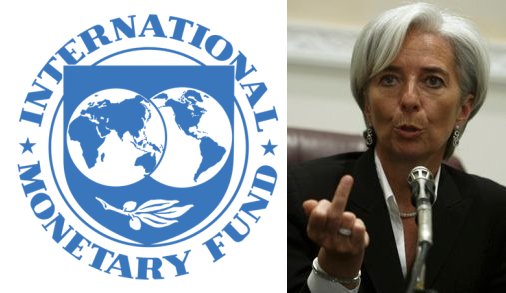
Christine Lagarde, Managing Director (Looter-in-Chief) of the IMF
Most often, unfortunately, the capital and interest from these loans end up being much too large for these countries to ever pay back. Yet once these loans have been dispensed, there is no turning back. As will be demonstrated with the Greece example below, the IMF will sometimes partner with another lender organization (such as the World Bank or European Central Bank for instance) as to exert even more influence to the borrowing country to repay. Think of the IMF as really big loan shark. Later on, when the borrowing country is no longer deemed solvent enough to repay back the loan, the IMF and its bully partners are quick to demand a further restructuring of its policies and even the seizure or privatization of its assets and resources. Such actions will further exacerbate the country’s ills and impoverish its citizens.
While all this may appear quite conspiratorial in nature, it is exactly what is occurring and has been occurring at the IMF for a very long time. To give credibility to this claim, we need to consider the perspective of an insider – someone who has worked at various levels with the IMF, World Bank, and other key players. The American John Perkins is one such insider; as Chief Economist at a major international consulting firm, John Perkins advised the World Bank, United Nations, IMF, U.S. Treasury Department, Fortune 500 corporations, and leaders of countries in Africa, Asia, Latin America, and the Middle East (11). John Perkins is a best-selling author known for his highly acclaimed 2004 book entitled ‘Confessions of an Economic Hit Man’. The book was originally published by Berrett-Koehler Publishers in 2004 but has been updated in 2016 as ‘The New Confessions of an Economic Hit Man’.
In an abstract for his book, Perkins says that as an "Economic Hit Man" his job was to convince countries that are strategically important to the United States to accept enormous loans for infrastructure development and to make sure that the lucrative projects were contracted to U.S. corporations. In describing what Economic Hit Men are and what they actually do, he says (12):
“They funnel money from the World Bank, the U.S. Agency for International Development (USAID), and other foreign “aid” organizations into the coffers of huge corporations and the pockets of a few wealthy families who control the planet’s natural resources. Their tools include fraudulent financial reports, rigged elections, payoffs, extortion, sex, and murder. They play a game as old as empire, but one that has taken on new and terrifying dimensions during this time of globalization. I should know; I was an EHM.”
Although the quote from above was from 2004, he recently stated that the Economic Hit Man “model” was very much still in effect today and is even more sophisticated (13).
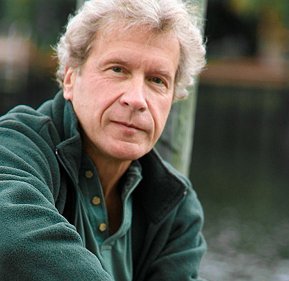
John Perkins, author of Confessions of an Economic Hit Man
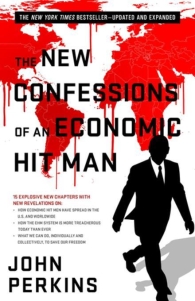
When Perkins was hired as an economist for the firm of Chas. T. Main his primary objectives were to produce economic growth projections that would make the case for a variety of major projects and, accordingly, justify huge loans for countries. He was supposed to help bankrupt the countries that received these loans after the U.S. companies involved had been paid. This would make sure that these countries would remain in debt to their creditors and would then be easy targets when the U.S. needed favors such as military bases, UN votes and access to natural resources like oil. All of these projects were meant to make huge profits for the contractors. The problem is that these countries simply cannot handle the debt of these loans and their poorest citizens are deprived of health, education and other social services for several decades as these countries struggle economically to overcome their huge debts (14).
The previous paragraph outlines the main duties Perkins followed along with their underlying objectives from which the source also provides instances of countries – Indonesia, Panama, Saudi Arabia – in which he was operating.
In a 2014 article and interview (15), Perkins demonstrates how Greece has fallen victim to “Economic Hit Men”. In the fascinating interview, Perkins describes how the IMF and EU (European Union) operates in much the same way as he did in the past:
“…they were left holding a huge debt, very much like what Greece has today, a phenomenal debt…And once [they were] bound by that debt, we would go back, usually in the form of the IMF - and in the case of Greece today, it's the IMF and the EU [European Union] - and make tremendous demands on the country: increase taxes, cut back on spending, sell public sector utilities to private companies, things like power companies and water systems, transportation systems, privatize those, and basically become a slave to us, to the corporations, to the IMF, in your case to the EU, and basically, organizations like the World Bank, the IMF, the EU, are tools of the big corporations, what I call the "corporatocracy.”
The excerpt above is extremely revealing to say the least. The selling of public sector utilities to private foreign corporations basically amounts to the financial raping of a country’s most precious assets. It’s also interesting to note that he also includes the European Union in the mix of thugs which is not all that surprising given that it is also a supranational organization that is extremely powerful and is headed by appointed (rather than elected) officials.
When asked how these international organizations go back in to get their “pound of flesh” (i.e., what must be paid back), he goes on to reply:
“By insisting that the countries adopt policies that will sell their publicly owned utility companies, water and sewage systems, maybe schools, transportation systems, even jails, to the big corporations. Privatize, privatize. Allow us to build military bases on their soil. Many things can be done, but basically, they become servants to what I call the corporatocracy. You have to remember that today we have a global empire, and it's not an American empire. It's not a national empire. It doesn't help the American people very much. It's a corporate empire, and the big corporations rule. They control the politics of the United States, and to a large degree they control a great deal of the policies of countries like China, around the world.”
He thus now outlines that it is not just American corporations who do the looting, but rather a global corporate empire which he refers to as a “corporatocracy”.
Interestingly, Perkins now devotes much of his time to help inform the public as well as foreign governments and institutions about these nefarious activities. As a case in point, he mentions that he appeared on Greek television during the time in which a Greek film company did a documentary entitled “Apology of an Economic Hit Man” in which he elaborates:
“…and I also spent a lot of time in Iceland and in Ireland. I was invited to Iceland to help encourage the people there to vote on a referendum not to repay their debts, and I did that and encouraged them not to, and they did vote no, and as a result, Iceland is doing quite well now economically compared to the rest of Europe.”
Iceland, as Perkins describes as a “not-to-be-bullied” nation which chose to not repay their debts is an interesting case indeed. Moreover, following the Financial Crisis of 2007-2008 Iceland was perhaps the only country that actually stood up to the bankers (or shall I call them “banksters”?) by prosecuting and jailing them since they were the main contributors that lead to the crisis. So, hopefully, the lesson here is that even smaller countries can stand up to these criminal organizations. But, sadly, that is more the exception than the rule, as these supranational organizations like the IMF and World Bank don’t really accept defeat.
In his book, Perkins notes that back in his day, countries such as Ecuador and Panama had leaders that actually cared for their people and wanted to make sure that their citizens could benefit from such loans and projects. But, as Perkins states, these particular leaders who didn’t “go along with the program” or “play the game” so to speak would get a visit from CIA-sanctioned “jackals” (as Perkins refers to them) who would take them out either by a coup or by assassination.
One needn’t look any further than in the Articles of Agreement (16) of the IMF itself, to notice how secretive and nefarious the organization is. Similar to the BIS, the IMF has its own dirty little secrets which they also make difficult to find, but can nonetheless be consulted from their own website. Just have a look at the following sections from Article IX – Status, Immunities, and Privileges to notice the similarities with those of the BIS:

Here, the Fund refers to the IMF. The section declares their immunity from the “judicial process”. To clarify the precise meaning of this term, we can consult its definition from Merriam-Webster dictionary which states: “the series of steps in the course of the administration of justice through the established system of courts”. The term “immunity” means protection from legal action, such as in “diplomatic immunity” whereby country officials conducting business in another country would be exempt from its laws. In other words, the IMF and its property and assets are untouchable by a country’s courts and even if they commit any wrongdoing, justice may never be administered.
The following two sections serve as added layers of protection:

Section 5 shows that the archives of the IMF are “inviolable” which basically means impregnable, or which cannot be consulted. Now, one would have to ask why the IMF would deny anyone access to its archives. After all, for an organization which states as its mission: “to foster global monetary cooperation, secure financial stability, facilitate international trade, promote high employment and sustainable economic growth, and reduce poverty around the world”, why couldn’t we see their data and information related to these aspects to indeed verify if they are accomplishing what they purportedly set out to do. One can easily ask: What do they have to hide?
Section 8 grants all officers and employees of the IMF legal immunity from any form of prosecution in addition to special privileges:
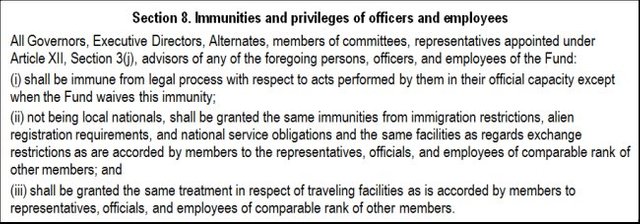
Briefly put, any employee or officer (no matter where they are conducting their business) of the IMF is untouchable and basically enjoys diplomatic immunity and can never be apprehended during travel. Including such clauses into their Articles of Agreement makes it quite clear and obvious that they consider themselves above the law of any nation, no matter what they do, how they do it, who they harm, or what they steal. Are those the ideals or principles of an organization that is supposed to do good in the world?
But wait, it gets even more heinous:

All of the IMFs income proceeds, assets, property are free from taxation, interest expense, as well as customs and duties regardless of which countries they operate in. Moreover, not a single IMF employee pays income tax from salaries received no matter where they work. How an organization that makes huge loans and charges monumental amounts of interest (apart from all the other assets they steal and plunder) which usually ends up being paid by the poorest of the poor can conduct itself with such an inequitable manner is beyond the scope of human comprehension. Perhaps worst, however, is how countries and citizens can stand idly by and watch and accept this.
The World Bank
The World Bank – another US-based organization – operates in much the same manner as the IMF, as it is involved in the same basic kinds of operations as described by the former Economic Hit Man John Perkins.
Similar to the IMF, the World Bank was created at the 1944 Bretton Woods Conference and is based in Washington, D.C. It was originally set up to provide loans to help rebuild countries devastated by World War II and, for the most part, it actually did a good job at that.
Since its inception, its stated goals have included the reduction of poverty and fostering development in poorer nations.
Today, it has morphed into an immense and complex international body called the World Bank Group which is comprised of five institutions (17), namely: The International Bank for Reconstruction and Development (IBRD), The International Development Association (IDA), The International Finance Corporation (IFC), The Multilateral Investment Guarantee Agency (MIGA), and The International Centre for Settlement of Investment Disputes (ICSID). Similar to the IMF and the BIS, these five groups each have their own Articles of Agreement (18) which conveniently lay out their status, immunities, and privileges. So once again, we can easily ascertain that one of their top priorities includes shielding themselves, their employees, and their assets from any possible form of legal prosecution or seizure emanating from any organization or country.
To get into lengthy details about the various projects the World Bank Group has undertaken over the years would be quite tedious and beyond the scope of this book. Yet it is important to lay forth and provide ample evidence regarding the trail of destruction and devastation left by this group. For this, I will introduce you to the International Consortium of Investigative Journalists (ICIJ) and their investigative project entitled ‘Evicted and Abandoned: The World Bank’s Broken Promise to the Poor’ (19) and let their facts and findings speak for themselves. This project was also splendidly presented through a series of articles, graphs, maps, videos, reports and documents by a team of reporters from the Huffington Post . On its main page, the Huffington Post (20) sets a bone-chilling statement to introduce the devastating effects spearheaded by the World Bank:
“Between 2004 and 2013, an estimated 3,350,449 people were forced from their homes, deprived of their land or had their livelihoods damaged because they lived in the path of a World Bank Project.”
More than 3 million people were physically or economically displaced by nearly 1,000 World Bank-financed projects between 2004 and 2013; an ICIJ analysis found that between 20 and 30 percent of all projects the bank funded from 2004 to 2013 were deemed likely to cause resettlement. Projects range from major oil pipelines and dams to small schools and clinics (21).
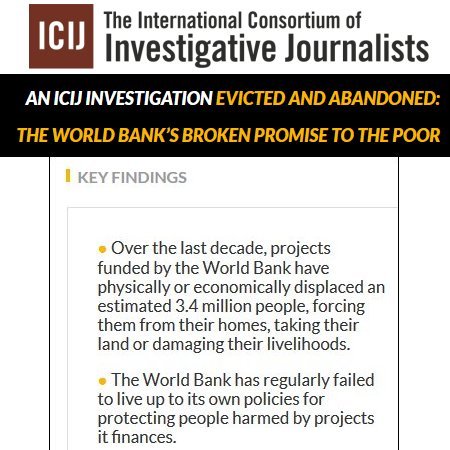
Now, for an organization that claims as its main goals to reduce poverty and foster development in poorer nations, the numbers undeniably attest to something much different. Numbers, however, don’t tell the whole story. The atrocities revealed in the ICIJ investigations point to much more inhumane actions and behaviors – even if they weren’t directly executed by World Bank officials. The investigations point to ineffective and inequitable policies of the World Bank institutions as implemented by their partners on the ground.
Key findings (22) of the ICIJ investigations include the following:
• Over the last decade, projects funded by the World Bank have physically or economically displaced an estimated 3.4 million people, forcing them from their homes, taking their land or damaging their livelihoods.
• The World Bank has regularly failed to live up to its own policies for protecting people harmed by projects it finances.
• The World Bank and its private-sector lending arm, the International Finance Corporation, have financed governments and companies accused of human rights violations such as rape, murder and torture. In some cases the lenders have continued to bankroll these borrowers after evidence of abuses emerged.
• Ethiopian authorities diverted millions of dollars from a World Bank-supported project to fund a violent campaign of mass evictions, according to former officials who carried out the forced resettlement program.
• From 2009 to 2013, World Bank Group lenders pumped $50 billion into projects graded the highest risk for “irreversible or unprecedented” social or environmental impacts — more than twice as much as the previous five-year span.
With countless resettlements, evictions, human rights violations (including but not limited to rape, murder, and torture), the trail of destruction and devastation becomes quite clear.
ICIJ’s Eviction & Abandoned project provides detailed accounts of exactly how the policies of the World Bank Group institutions and their partners on the ground have led to destruction in Kenya, Ethiopia, India, Peru, Honduras, and Kosovo, among many other countries around the world. In these accounts you will learn about the horrendous and heart-breaking stories of the individuals who have had to suffer the consequences of the World Bank Group’s endeavors.
One has to wonder what the employees of the World Bank Group would think and feel should such projects affect their own homelands and livelihoods. And would they feel even worse if they learned that the wrongdoers are completely immune from prosecution? Unfortunately, most of these employees probably think they are doing good and are even blind and unaware of the real consequences of the projects they participate in.
Sadly, the recent past and foreseeable future indicate an even darker horizon under the new structure of the World Bank Group.
In a world drunk on financial liquidity (that means the trillions of dollars that have been created by central banks in since the 2007-2008 Financial Crisis) the Group has recently decided to put these funds to work in the form of “outsourced” projects through its strong arm institution – the International Finance Corporation, or IFC for short.
In other words, it is now leaving it up to for-profit-institutions such as commercial and investment banks (of various countries) to determine which projects are to be undertaken and also who they partner with locally and how they are implemented. Such a shift in practice and decline in standards will assuredly lead to even greater devastation and destruction, as such institutions care almost exclusively about profits and have very little regard to human cost and suffering, not to mention environmental degradation.
Another investigative unit – Inclusive Development International, or IDI – has recently outlined how the International Finance Corporation (IFC) of the World Bank Group has changed its way of doing business in its campaign entitled ‘Outsourcing Development: Lifting the veil on the World Bank Group’s lending through financial intermediaries’ (23) . Here are some revealing findings of the investigation campaign:
• For years, the World Bank’s private-sector arm provided loans almost exclusively to companies and projects. Now, the IFC is outsourcing the bulk of its development work to for-profit financial institutions. Between 2010 and 2015, the IFC provided $50 billion to commercial banks, private equity funds and insurance firms. These financial intermediaries then invested the money as they saw fit, with little apparent oversight from the IFC. The World Bank has regularly failed to live up to its own policies for protecting people harmed by projects it finances.
• The investigation tackled has only a small portion of the IFC’s extensive financial-sector portfolio. Yet the results have been shocking. The IFC is funneling billions of dollars into some of most notorious companies and projects in the world. The problem is systemic, and not limited to just a few cases.
• In many instances, these investments have done more than just fail to help the poor. They have actually caused great harm to people and the environment. According to our investigation, IFC intermediaries have financed companies that have forcibly evicted and impoverished hundreds of thousands of people. They have contributed to climate change, ravaged forests, polluted the oceans and rivers, and killed endangered species. Activists who have dared to resist them have been jailed, beaten and even murdered.
• The projects come from a range of high-risk sectors, such as energy, agribusiness, mining, transportation and infrastructure. They are located in Africa, Asia and Latin America. The findings include some of the most notorious industrial disasters. Yet until now, the IFC’s involvement was unknown.
By letting for-profit financial institutions take the helm of “development” projects, it is not surprising to witness the level of destruction and disregard for human life and the natural environment, as enumerated above. How the World Bank Group can employ such a change in strategy is morally incomprehensible, let alone criminal. Perhaps worse is how the nations of the world can sit idly by and let this global genocide occur.
IDI has also kept a database of harmful IFC projects which lists serious adverse social, environmental, and human rights risks and impacts for countless countries ranging from Australia to Zambia. The document runs 338 pages long listing the specific projects, companies, amounts invested, and harmful impacts. Of particular concern are the tremendously destructive effects these projects have thus far had on the natural environments not only of the regions affected, but also of the irreparable harm inflicted on our planet and its natural resources as a whole.
Oxfam International – an organization dedicated to fighting poverty and human injustice – has also recently weighed-in on the IFC’s recent shift in a decentralized policy. They have concluded that: “Billions in “out of control” IFC investments into third-parties causing human rights abuses around the world” (25). Some of their highlights also corroborate the adverse effects uncovered in the ICIJ investigations mentioned above:
• The International Finance Corporation has little accountability for billions of dollars’ worth of investments into banks, hedge funds and other financial intermediaries, resulting in projects that are causing human rights abuses around the world. The investigation tackled has only a small portion of the IFC’s extensive financial-sector portfolio. Yet the results have been shocking. The IFC is funneling billions of dollars into some of most notorious companies and projects in the world. The problem is systemic, and not limited to just a few cases.
• The painful truth is that the IFC does not know where much of its money under this new model is ending up or even whether it’s helping or harming,” said Nicolas Mombrial, head of Oxfam International’s Washington DC office.
• We describe some shocking abuses in projects originally born of IFC investments to third parties across Asia, Africa and Latin America, including deaths, repression, land-grabs and violence.
In October of 2016, Oxfam produced another report entitled ‘Owning the outcomes’ whereby it advocates making World Bank Group's financial intermediary investments more accountable. Here is the opener to the report:
“Over the past six years, the International Finance Corporation has channelled over $50bn to the financial sector, and its long-term investments in financial intermediaries such as commercial banks and private equity funds have dramatically risen by 45 percent over that same period. However, the evidence continues to grow that this private sector arm of the World Bank Group has little control over how a great deal of this money is spent. This lack of accountability is having devastating impacts on many poor communities. The IFC must start taking more responsibility for these outcomes and ensure that its investments are benefitting, rather than harming people and the environment.”
Oxfam International and other NGOs (Non-Governmental Organizations) have produced a report entitled ‘The Suffering of Others’ (27) which says that the IFC is failing to perform due diligence and to identify or effectively manage risk in many of its investments in third-party lenders. The 32 page report lays out the adverse impacts of some projects funded by the IFC, including a $70 million one into Banco Ficohsa (a Honduran bank) which financed an agribusiness corporation called Dinant who were responsible for violence and murder against farmers on palm oil plantations in Honduras’ Aguán Valley.
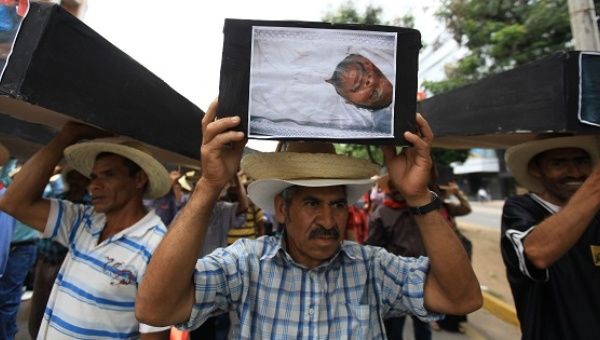
Campesinos march with mock coffins with images of victims from the Aguan Valley region during a demonstration in Tegucigalpa, Honduras, Sept. 15, 2012. Photo source
EarthRights International (ERI) – a nonprofit organization that combines the power of law and the power of people in defense of human rights and the environment (28) – filed a federal lawsuit on March 8th, 2017 on behalf of Honduran farmers charging two World Bank Group members with aiding and abetting gross violations of human rights (29). Although the case appears to be extremely well put together, it will remain to be seen whether they are able to get the case to trial, as World Bank Group members such as the IFC and their employees have very strong immunities as was previously outlined earlier in this chapter.
Notes:
(10) About the IMF, URL: http://www.imf.org/en/About, accessed: 2017-06-28
(11) About John Perkins, URL: http://johnperkins.org/about, accessed: 2017-06-28
(12) Wikiquote – John Perkins, URL: https://en.wikiquote.org/wiki/John_Perkins, accessed: 2017-07-04
(13) How Economic Hitmen Gained World Domination for Deep State w/ John Perkins (YouTube channel: Sarah Westall), accessed: 2017-07-04
URL:
(14) Confessions of An Economic Hitman (Concise Summary), URL: http://www.bibliotecapleyades.net/sociopolitica/sociopol_globalbanking14.htm, accessed: 2017-07-04
(15) An Economic Hit Man Speaks Out: John Perkins on How Greece Has Fallen Victim to "Economic Hit Men" by Michael Nevradakis, URL: http://www.truth-out.org/news/item/26112-an-economic-hit-man-speaks-out-john-perkins-on-how-greece-has-fallen-victim-to-economic-hit-men, accessed: 2017-07-04
(16) IMF Articles of Agreement (2016 Amended version), URL: http://www.imf.org/external/pubs/ft/aa/pdf/aa.pdf, retrieved: 2017-07-05
(17) The World Bank – About the World Bank – Organization World Bank Group – Five Institutions, One Group, URL: http://www.worldbank.org/en/about, accessed: 2017-07-09
(18) The World Bank – About us – Organization – Boards of Executive Directors – Articles of Agreement, URL: http://web.worldbank.org/WBSITE/EXTERNAL/EXTABOUTUS/ORGANIZATION/BODEXT/0,,contentMDK:50004943~menuPK:64020045~pagePK:64020054~piPK:64020408~theSitePK:278036,00.html, accessed: 2017-07-09
(19) The International Consortium of Investigative Journalists (ICIJ) - Projects - Evicted and Abandoned: The World Bank’s Broken Promise to the Poor, URL: https://www.icij.org/project/world-bank, accessed: 2017-07-09
(20) The Huffington Post – Evicted & Abandoned, URL: http://projects.huffingtonpost.com/worldbank-evicted-abandoned, accessed: 2017-07-09
(21) The International Consortium of Investigative Journalists (ICIJ) - Projects - Evicted and Abandoned: The World Bank’s Broken Promise to the Poor – Explore 10 Years of World Bank Resettlement Data, URL: https://www.icij.org/project/world-bank/explore-10-years-world-bank-resettlement-data, accessed: 2017-07-09
(22) The International Consortium of Investigative Journalists (ICIJ) - Projects - Evicted and Abandoned: The World Bank’s Broken Promise to the Poor – Key Findings, URL: https://www.icij.org/project/world-bank/key-findings, accessed: 2017-07-09
(23) Inclusive Development International (IDI) – Outsourcing Development – Lifting the Veil on the World Bank Group’s Lending Through Financial Intermediaries, URL: http://www.inclusivedevelopment.net/what/campaigns/outsourcing-development/, accessed: 2017-07-09
(24) Inclusive Development International (IDI) – International Finance Corporation – Financial Intermediary Portfolio – Sub-Investments with Serious Adverse Social, Environmental and Human Rights Risks and Impacts, URL: https://docs.google.com/document/d/1EuJG-o9WOrzqUKk8deWaXAooGWa3jKGbk6vDFB9DBiM/edit, accessed: 2017-07-09
(25) Oxfam International – Billions in “out of control” IFC investments into third-parties causing human rights abuses around the world (2 April 2015), URL: https://www.oxfam.org/en/pressroom/pressreleases/2015-04-02/billions-out-control-ifc-investments-third-parties-causing-human-rights-abuses, accessed: 2017-07-10
(26) Oxfam International – Owning the outcomes, URL: https://www.oxfam.org/en/research/owning-outcomes, accessed: 2017-07-10
(27) Oxfam International – The suffering of others (2 April 2015), URL: https://www.oxfam.org/en/research/suffering-others, accessed: 2017-07-10
(28) About EarthRights International, URL: https://www.earthrights.org/about/about-earthrights-international, accessed: 2017-07-10
(29) EarthRights International (ERI) – Honduran Farmers Sue World Bank Group for Human Rights Violations, URL: https://www.earthrights.org/media/honduran-farmers-sue-world-bank-group-human-rights-violations, accessed: 2017-07-10

Wow that is extensive. I'm gonna bookmark it and come back when I have time to finish. Followed.
Thank you. BTW, love your post "I'm just a bill, sitting on Capital Hill"; so true!
Thanks man! I wish I could give your post $100 upvote. This much work deserves it!
Thank you my friend. To me, it is not about the upvotes or $; rather, it is about spreading the word and getting it in front of as many eye balls as possible. Thus, resteeming is what really counts. Cheers though.
I've decided to spend this weekend reading all this highly informative material you have put together. In my opinion, the series is among the best posts I've read on the platform. Thank you for taking the time to put it all together. Very well done. Upvoting and Resteeming.
Thank you for your kind praise, vote, and resteem, as it is very much appreciated. It's Christopher, correct? I always enjoy conversing with you.
Indeed it is. Thank you Dan. I'm on Facebook (if you are) and would like to do a friend request. I'm slowly trying to move off that platform but still need it for now as I have about 150 of the best geopolitical researchers as friends these days. I pretty much only use it for geopolitical info exchange. https://www.facebook.com/chris.harrison.7509?ref=bookmarks
Dear Christopher, I barely use Facebook anymore; but we can keep in touch here and perhaps by email. Cheers.
Not sure if you saw my post in the other thread Dan. You can also get in touch with me by email at [email protected]
Dear Christopher, a thousand apologies for my tardiness, as it completely slipped my mind. I will send it momentarily.
Post is up now on my page. I hope you like it. :) Good work.
Good Stuff. Thanks for putting it all together in one spot. Looking forward to part 4
Dan, also wanted to ask you about my possibly making one large post on your work here and transferring any cryptocurrency made on the post to you, as I believe this global banking material you have put together needs much more exposure than its currently getting. I may be able to help in a small way with a post on it. If you would allow it, then I will stipulate in the post that any cryptocurrency derived form sharing your work directly would be transferred to you by myself. The after 6 days will transfer the funds to you. Let me know what you think. I will stake my reputation upon the trust that I hope you would place upon me for such. Kind regards.
Dear Christopher, thank you very much for this kind offer. I trust you and am totally for it, as my main objective is to spread it as far and wide as possible. But would only ask that you keep the reference of me @libertyacademy being its author so I can also get more followers. To make it easier to repost, perhaps you can tell me your email address and I can send you the "Steemit HTML Code" (sorry, I don't know what it is called) for all four parts and the pictures if need be. Part IV is now posted which completes the series! Just let me know. And thanks again for your kind offer.
Hi Dan, sorry about the little late reply. Thanks for accepting the request. I will gladly make sure that you are given full credit at the beginning and end of the post plus I will include a copy of this convo as a screenshot so that others can see I have permission from you to share your excellent work. My email is [email protected] I was thinking of having the post include the top sections of all four posts and then linking to the other material for each separate post so that it makes it easier for people to access it all plus bring you the attention you deserve for it. Then I will share widely here, on Facebook, Reddit and Twitter. Thus, there would be three credits to you for the material. One up top, one at bottom, plus the screenshot. Kind regards.
Christopher, once again sorry for the delay. I just emailed you the files. Let me know if you didn't receive them. Please let me know when you've posted it on your Steemit blog. Have a great day!
Thanks Dan, been working on some new White Helmets posts due to this latest false flag provocations so been a bit busy, but planning to move on it soon. Kind regards. Chris
Good work. Keep it up.
Thank you very much. I appreciate it.
So informative, will definitely wait for the next part. Keep it up!
Part IV is ready. The link is updated at the top of this page, or click the following:
https://steemit.com/money/@libertyacademy/the-international-banking-cabal-exposed-part-iv-central-banks-and-conclusion
Thank you for your interest in my post.